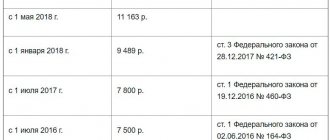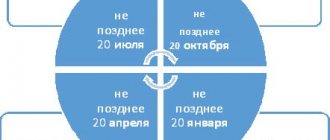Staffing activities
Since 2021, two new concepts have been introduced into labor legislation: agency work and activities for the provision of personnel. At the same time, agency labor is prohibited by law.
Activities for the provision of personnel are the temporary sending by the employer (sending party) of its employees, with their consent, to an individual or legal entity that is not the employer of these workers (the receiving party) for the employees to perform labor functions specified in their employment contracts in the interests, under the management and control of the receiving party. parties (clause 2 of article 1 of the Federal Law of 05.05.2014 No. 116-FZ, article 18.1 of the Law of the Russian Federation of 04/19/1991 No. 1032-1 “On employment in the Russian Federation”).
The circle of persons who, starting from 2021, can carry out activities to provide labor for workers is limited.
| The right to carry out activities to provide personnel from 2021 | |
| Accredited private employment agencies | Other organizations, in strictly defined cases |
The procedure and accreditation of private employment agencies for the right to carry out activities to provide labor to workers (personnel) are indicated on the Rostrud website. The website also contains a telephone number where you can get advice on such issues. You can also contact Rostrud in writing for clarification. It must be borne in mind that a written appeal must necessarily contain:
- name of the state body or local government body to which the written appeal is sent;
- or the surname, name, patronymic of the relevant official, or the position of the relevant person;
- Your last name, first name, patronymic (the latter - if available);
- postal address to which the response should be sent, notice of forwarding of the request (email address if the response should be sent in the form of an electronic document);
- the essence of the proposal, statement or complaint;
- Your personal signature and date.
GOOD TO KNOW
Agency labor is understood as work performed by an employee at the order of the employer in the interests, under the management and control of an individual or legal entity that is not the employer of the employee.
Law No. 116-FZ establishes certain requirements for such agencies. They have to:
- be a legal entity registered in the Russian Federation;
- apply a general taxation system. Organizations applying special tax regimes will not be able to be private employment agencies (Clause 6, Article 18.1 of Law No. 1032-1). In this regard, from 2021 in paragraphs. 21 clause 3 art. 346.12 of the Tax Code of the Russian Federation directly states that private employment agencies engaged in providing labor to workers (personnel) do not have the right to use the “simplified tax”;
- undergo accreditation to carry out this type of activity. Mandatory conditions for accreditation: authorized capital of at least 1 million rubles, absence of debts on taxes and fees, the manager has a higher education, work experience in the field of employment or promoting employment in the Russian Federation for at least two years over the last three years, the manager has no criminal record agencies for committing crimes against the person or crimes in the economic sphere.
A private employment agency has the right to send workers on the basis of a contract for the provision of personnel:
- to an individual who is not an individual entrepreneur for the purpose of personal service and assistance with housekeeping;
- an individual entrepreneur or company to temporarily perform the duties of absent employees who retain their place of work;
- an individual entrepreneur or company to carry out work related to a deliberately temporary (up to nine months) expansion of production or the volume of services provided.
GOOD TO KNOW
Federal laws may establish additional restrictions on sending workers to work under a contract for the provision of labor for employees (personnel).
Other legal entities, including foreign ones, will be able to carry out activities to provide labor for workers only if, with their consent, the workers are temporarily sent:
- to an affiliated organization;
- to a joint-stock company, if the sending party is a party to a shareholder agreement on the exercise of rights certified by shares of such a joint-stock company;
- to an organization that is a party to a shareholder agreement with the sending party (clause 3 of Article 18.1 of Law No. 1032-1).
That is, this category does not have the right to provide personnel services to outside companies. And these outsiders are her employees, because this will be the use of agency labor.
Please note: the organization does not have the right to use workers hired under a contract for the provision of labor:
- to replace workers participating in a strike;
- to perform work in case of downtime;
- in case of bankruptcy;
- when introducing a part-time regime in order to preserve jobs in the face of the threat of mass layoffs of workers;
- to replace workers of the receiving party who refused to perform work in cases and in the manner established by labor legislation, including replacing workers who temporarily suspended work due to a delay in paying them wages for a period of more than 15 days;
- performing work at facilities classified as hazardous production facilities of hazard classes I and II, certain types of work, lists of which are approved in the manner established by the Government of the Russian Federation;
- performing work in workplaces where working conditions are classified as hazardous working conditions of the 3rd or 4th degree or hazardous working conditions;
- filling individual positions in accordance with the staffing table, if the presence of employees filling such positions is a condition for obtaining a license or a condition for membership in a self-regulatory organization.
GOOD TO KNOW
Under a contract for the provision of personnel, the contractor temporarily sends his workers, with their consent, to the customer to perform by these workers the labor functions specified in their employment contracts in the interests, under the management and control of the customer, and the customer undertakes to pay for services for the provision of labor of workers (personnel) and to use the labor of those sent workers to it in accordance with labor functions defined by employment contracts concluded by these workers with the contractor.
Registration of legal relations
As for the formalization of relations between such organizations and those to whom the workers are transferred. The agreement with the party receiving the workers (individual or organization) will be called the “Agreement on the provision of labor for workers (personnel).” Under such an agreement, the contractor (for example, a private employment agency) temporarily sends its employees, with their consent, to the customer to perform labor functions defined by their employment contracts, in the interests, under the management and control of the customer. And the customer is obliged to pay for the services of the organization that provided the personnel and to use the labor of the workers sent to him in accordance with the labor functions defined by their employment contracts (clause 2 of article 18.1 of Law No. 1032-1).
A private employment agency is obliged to conclude an employment contract with an employee who will be temporarily sent to work in another organization or to an individual and make an entry in his work book (part one of Article 341.2 of the Labor Code of the Russian Federation). When an employee is sent to the receiving party, labor relations do not arise between it and the employee (part four of Article 341.2 of the Labor Code of the Russian Federation).
GOOD TO KNOW
The customer of services for the provision of personnel (receiving party) can, in principle, be any individual or legal entity. However, the very possibility of providing personnel labor (and, accordingly, using such services) is associated with certain restrictions.
Entry in the work book
What content should be included in the work book for agency personnel? Unfortunately, with the introduction of Ch. 53.1 of the Labor Code of the Russian Federation, no changes were made to the Instructions for filling out work books, approved by Resolution of the Ministry of Labor of Russia dated October 10, 2003 No. 69. It can be assumed that in the column “Information on hiring, transfer to another permanent job, qualifications, dismissal” an entry should be made the following content:
“Work under a contract for the provision of labor for workers (personnel) in “_________________” (name of organization), for example, from 03/15/2016 to 10/15/2016.”
In the column “Name, date and number of the document on the basis of which the entry was made” there is a link to the agreement on the provision of personnel.
Such an agreement must contain a condition that the employee, at the order of the employer, perform a certain labor function in the interests, under the management and control of persons who are not employers under this employment agreement (part one of Article 341.2 of the Labor Code of the Russian Federation).
The remuneration of third-party workers must be no less than the remuneration of workers of the receiving party of the same qualifications, performing the same labor functions (part two of Article 341.1 of the Labor Code of the Russian Federation). Compensation for work under harmful and/or dangerous working conditions is established on the basis of information provided by the receiving party (part three of Article 341.1 of the Labor Code of the Russian Federation).
GOOD TO KNOW
Unlike private employment agencies, other legal entities that have the right to provide services for the provision of personnel labor are not bound by any restrictions regarding the scope of activity of the assigned workers. However, restrictions on the use of labor of such workers established by paragraph 12 of Art. 18.1 of Law No. 1032-1 also apply to them.
Additional agreement to the employment contract
When sending an employee to work with a specific host party (with which an agreement on the provision of personnel has been concluded), the employment agency and the employee enter into an additional agreement to the employment contract. This agreement is an integral part of the employment contract and must contain information (part five of Article 341.2 of the Labor Code of the Russian Federation):
- about the receiving party, including its name (full name - for an individual), information on identification documents (for an individual), TIN of the receiving party (with the exception of an individual who is not an entrepreneur);
- on the place and date of conclusion of the employment contract;
- about the number and validity period of the contract for the provision of personnel.
Additional agreements to the employment contract should be concluded with the employee for each receiving party for whom he will work (part six of Article 341.2 of the Labor Code of the Russian Federation).
Such an agreement may also contain additional rights and obligations of the employee and the receiving party, reflected in the agreement on the provision of personnel (clause 8 of Article 341.2 of the Labor Code of the Russian Federation).
If suddenly the accreditation of an employment agency is suspended or revoked, it loses the right to conclude employment contracts for sending workers under a staff supply agreement.
However, all rights and obligations under previously concluded employment contracts are retained (Clause 9, Article 18.1 of the Employment Law No. 1032-1).
GOOD TO KNOW
The law does not name any conditions as essential or necessary for a contract for the provision of personnel. Consequently, due to the legal requirement common to all types of contracts, the essential condition of this contract is its subject matter. The subject of the contract for the provision of personnel includes the provision by the contractor (sending party) of its personnel at the disposal of the customer (receiving party) to perform certain labor functions.
Who must submit notifications of an accident in accordance with Art. 228.1 of the Labor Code of the Russian Federation (customer or contractor under an agreement for the provision of personnel)?
Quite a reasonable question. Specialists of the information portal of Rostrud “Onlineinspektsiya.RF” answer as follows: “Employees sent to work for another employer (Customer under a personnel supply agreement) perform labor functions in the interests, under the management and control of the specified employer.
An accident that occurs with an employee sent to perform work for another employer and participating in his production activities is investigated by a commission formed by the employer who experienced the accident (i.e., the Customer under the contract for the provision of personnel). The same employer is obliged to send a notice of the accident to the relevant authorities, as well as to the employer who sent the employee with whom the accident occurred (that is, the Contractor under the contract for the provision of personnel).”
GOOD TO KNOW
In fact, the activities of workers whose labor is placed at the disposal of the customer are carried out taking into account the internal labor regulations (in particular, working hours) of the receiving party (the possibility of stipulating in the contract for the provision of personnel a condition on the subordination of workers to these rules follows from part eight of Article 341.2 of the Labor Code RF), however, formally, employees are responsible for the performance of their labor duties not to the customer, but to the contractor.
Termination of the contract for the provision of personnel
As for the termination of the contract for the provision of personnel, at the moment it is not possible to give an unambiguous legal qualification to the contract for the provision of labor for employees. However, since the provision of workers (personnel) is a service (clause 2 of article 18.1 of Law No. 1032-1), there are grounds to qualify this agreement as a type of contract for the provision of paid services (clause 2 of article 779 of the Civil Code of the Russian Federation).
A contract for the provision of personnel may be terminated on the grounds provided for by the general provisions of the Civil Code of the Russian Federation on the contract, taking into account the features provided for the contract for the provision of paid services. In particular, such an agreement can be terminated at any time by agreement of the parties. It can also be terminated by a court decision in cases provided for by the Civil Code of the Russian Federation, other laws or the agreement itself. Finally, the basis for termination of a contract for the provision of personnel may be a unilateral refusal to fulfill the contract. The law allows for the possibility of such a refusal both on the part of the customer (subject to payment to the contractor for the expenses actually incurred by him) and on the part of the contractor (subject to full compensation for losses to the customer) (clause 2 of article 310, article 450, 450.1, 451 , 782 Civil Code of the Russian Federation).
- Back
- Forward
Registration
Orders of the Ministry of Labor of Russia No. 858n, Rostechnadzor No. 455 of November 11, 2015, in pursuance of the Decree of the Government of the Russian Federation of April 10, 2015 No. 340, approved lists of certain types of work at facilities classified as hazardous production facilities of hazard classes I and II; it is not allowed to send workers to private employment agencies under an agreement on the provision of labor for workers (personnel).
Seven lists have been approved.
I. List of works performed at facilities where flammable, combustible, toxic, highly toxic, oxidizing, explosive substances and substances hazardous to the environment are produced, used, processed, generated, stored, transported, destroyed in quantities corresponding to I and II hazard classes in accordance with Appendix 2 to the Federal Law of July 21, 1997 No. 116-FZ “On Industrial Safety of Hazardous Production Facilities”:
- work on operation, maintenance, repair, overhaul, conservation or liquidation of a hazardous production facility where technical devices are used that come into contact with hazardous substances or operate under excess pressure of more than 0.07 megapascal;
- work related to the handling of industrial explosives.
II. List of works performed at chemical weapons storage facilities, chemical weapons destruction facilities and hazardous special chemical production facilities:
- work on operation, maintenance, overhaul, reconstruction, conservation and liquidation of the consequences of the activities of chemical weapons storage facilities, chemical weapons destruction facilities and hazardous special chemical production facilities;
- work involving toxic chemicals associated with chemical weapons and equipment exposed to toxic chemicals associated with chemical weapons.
III. List of works performed at hazardous production facilities for drilling and producing oil, gas and gas condensate, hazardous in terms of emissions of products containing hydrogen sulfide over 6 percent of the volume of such products:
- work on operation, maintenance, repair, overhaul, conservation or liquidation of a hazardous production facility, which uses technical devices used in drilling and production of oil, gas and gas condensate or operating under excess pressure of more than 0.07 megapascal.
IV. List of works performed at gas distribution stations, gas distribution networks and gas consumption networks intended for transporting natural gas under pressure over 1.2 megapascals or liquefied petroleum gas under pressure over 1.6 megapascals:
- work on operation, maintenance, repair, overhaul, conservation or liquidation of a hazardous production facility, which uses technical devices used at gas distribution stations, in gas distribution and gas consumption networks or operating under excess pressure of more than 0.07 megapascal.
V. List of works performed at facilities where melts of ferrous and non-ferrous metals, alloys based on these melts are produced, transported, used, using equipment designed for a maximum amount of melt of 10,000 kg or more:
- work on operation, maintenance, repair, overhaul, conservation or liquidation of a hazardous production facility, where technical devices are used in the production, transportation and use of ferrous and non-ferrous metal melts, alloys based on these melts, or operating under excess pressure of more than 0, 07 megapascals.
VI. List of works performed at sites where open-pit mining is carried out (except for the extraction of common minerals and the development of alluvial mineral deposits carried out by open-pit mining without the use of blasting, as well as open-pit mining with a mining volume of less than 1 million m3 of rock mass per year ), sites where underground mining is carried out for the purpose of extracting minerals using the underground method and constructing underground structures, including sites of underground mining in subsoil areas where explosions of gas and (or) dust, sudden emissions of rock, gas and ( or) dust, rock bursts, water breakthroughs into underground mine workings, as well as coal (oil shale) processing:
- work on the construction, arrangement, operation, conservation, liquidation, maintenance, repair of mine workings at underground and open-pit mining sites;
- work on the operation, maintenance, and repair of technical devices used during mining operations for the construction of underground structures, mining, enrichment and processing of coal (oil shale), including equipment operating under excess pressure of more than 0.07 megapascal.
VII. List of work performed at hazardous production facilities of hazard class III, located on lands of specially protected natural areas, the continental shelf of the Russian Federation, in internal sea waters, in the territorial sea or the adjacent zone of the Russian Federation, on an artificial land plot created on a water body located in federal ownership:
- work on operation, maintenance, repair, overhaul, conservation or liquidation of a hazardous production facility that uses technical devices used in drilling and production of oil, gas and gas condensate, hazardous in terms of emissions of products containing hydrogen sulfide from 1 to 6 percent of volume such products, or operating under excess pressure of more than 0.07 megapascal;
- work on operation, maintenance, repair, overhaul, conservation or liquidation of a hazardous production facility, where technical devices used at gas distribution stations, in gas distribution and gas consumption networks, not related to hazardous production facilities of hazard classes I and II, are used, or operating under excessive pressure more than 0.07 megapascal;
- work on operation, maintenance, repair, overhaul, conservation or liquidation of a hazardous production facility, which uses technical devices used to supply heat to the population and socially significant categories of consumers, defined in accordance with the legislation of the Russian Federation in the field of heat supply, or operating under excess pressure 1.6 megapascals or more, or at a working environment temperature of 250 degrees Celsius or more;
- work on the construction of aerial cableways;
- operation, maintenance and repair of aerial ropeway equipment;
- work on operation, maintenance, repair, overhaul, conservation or liquidation of a hazardous production facility, which uses technical devices used in the production, transportation and use of ferrous and non-ferrous metal melts, alloys based on these melts, designed for a maximum amount of melt from 500 to 10,000 kilograms, or operating under an excess pressure of more than 0.07 megapascal;
- work on the construction, development, operation, maintenance, repair of open-pit mines with a volume of rock mass development from 100 thousand to 1 million cubic meters per year;
- work on the operation, maintenance, repair of technical devices used in open-pit mining for the purpose of extracting minerals, equipment of facilities where mineral processing work is carried out (with the exception of coal (oil shale) processing facilities), including equipment operating under excess pressure of more than 0.07 megapascal;
- work on the operation, maintenance, repair of technical devices of elevators, hazardous production facilities of flour-grinding, cereal and feed milling production, where storage or processing of plant raw materials is carried out, during which explosive dust-air mixtures are formed that can spontaneously ignite, ignite from an ignition source and burn independently after it removal, as well as storage of grain, products of its processing and feed raw materials that are prone to self-heating and spontaneous combustion.






